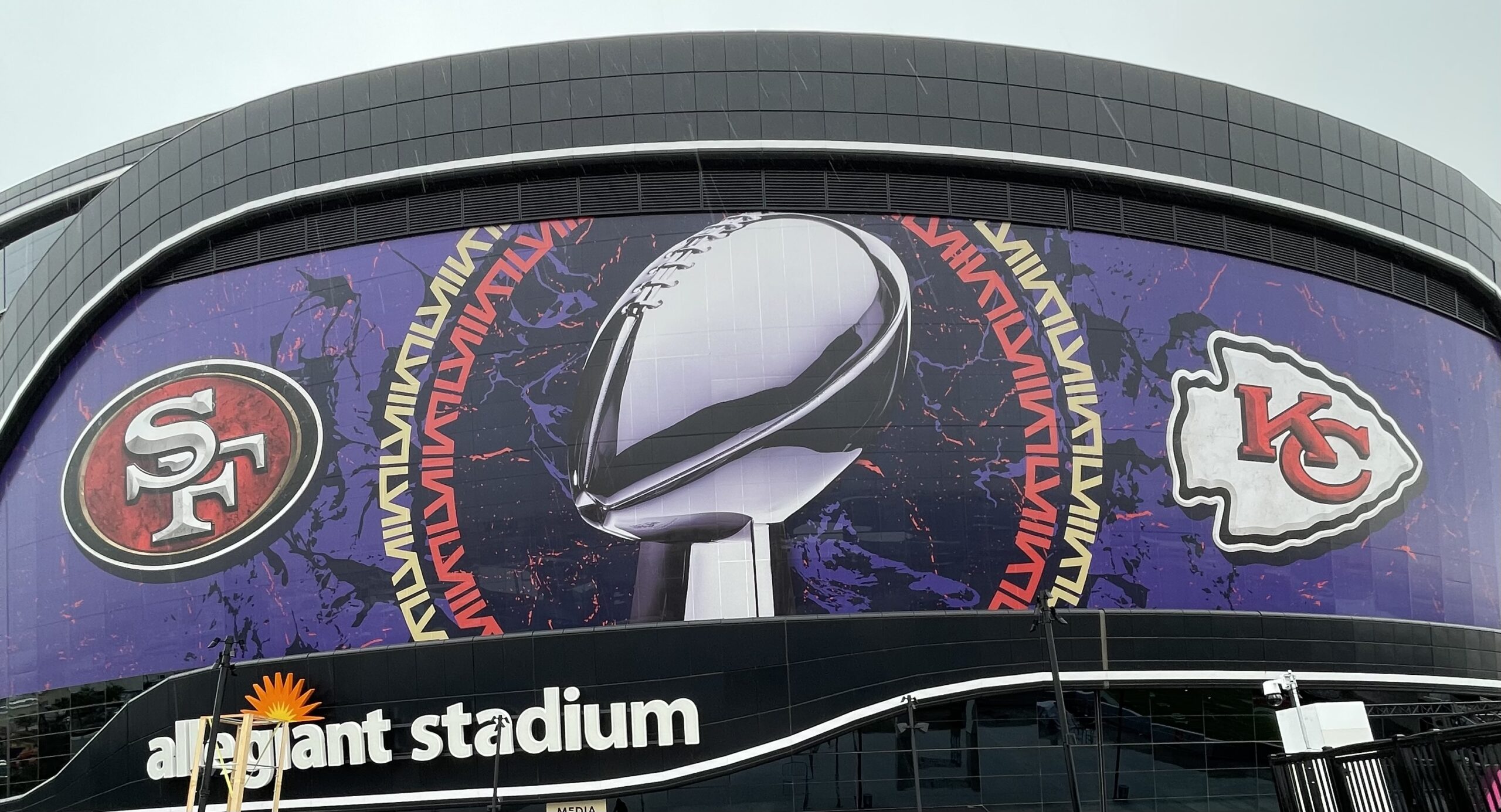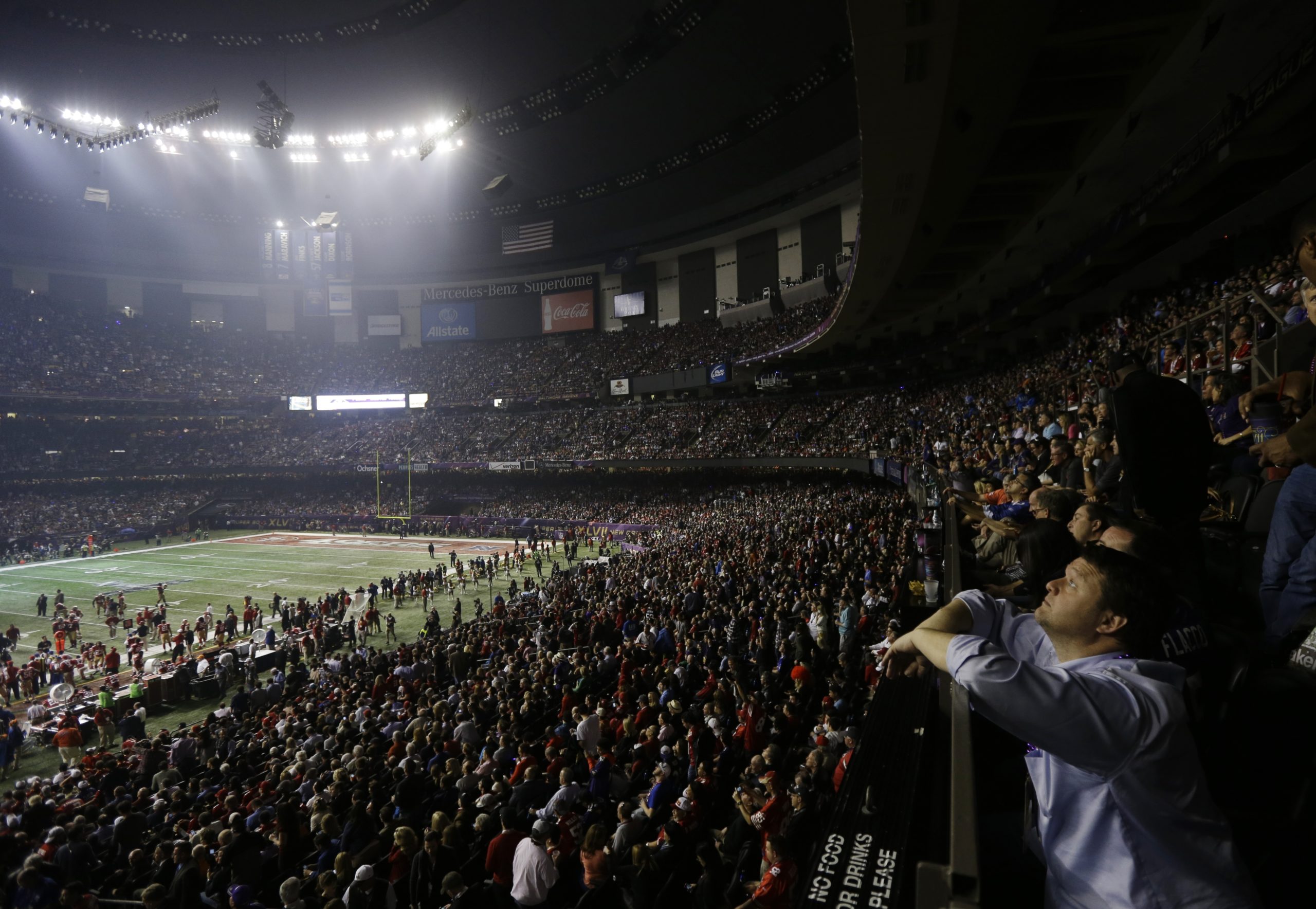ASM Global’s Fingerprints Are All Over Super Bowl 58
The company is helping stage Las Vegas' inaugural big game in the midst of a merger
Posted On: February 9, 2024 By :Doug Thornton has been in the sports and events industry for nearly three decades. Based in New Orleans, he’s been through the tragedy of Hurricane Katrina and was there when the lights went out in the Superdome in the middle of the 2013 Super Bowl.
There may be no better person to talk about the past, present and future of Super Bowl venues than Thornton, the executive vice president of arena, stadium and theater at ASM Global.
Allegiant Stadium, which will host Super Bowl 58 on Sunday, is one of seven ASM-controlled NFL stadiums and is by far the newest, opening in 2020. Thornton admits a Vegas Super Bowl is something he never thought he’d see.
“There was always this opposition to gaming,” Thornton said. “I remember in 1993 making the presentation in front of the NFL owners for Super Bowl 31 to be played in 1997 in New Orleans. And at that time, New Orleans was considering a land-based casino. And the big issue at that meeting was whether or not that casino would have sports betting. Our governor at the time stood up in the meeting and said, ‘I will give you my commitment that we will not have sports betting at that casino.’ And we were awarded the game.”
There were also several owners in the room that day in 1993 who were against selecting New Orleans because of the riverboat gambling that was legal in the area. Three decades later, the NFL has an official sportsbook sponsor, betting lines and prop bets are discussed during broadcasts.
“Las Vegas is a great town with a great infrastructure, including 157,000 hotel rooms,” Thornton said. “I think it’s a great location, but I never thought 25 or 30 years ago — when we were presenting that bid at the Rosemont Hyatt in Chicago in front of those NFL owners — that Las Vegas would get a Super Bowl, because there was such an opposition to it back then with regard to the New Orleans situation.”
Sunday is the second of three consecutive Super Bowls at ASM Global-managed venues after last year at State Farm Stadium in Glendale, Arizona, and next year at the Caesars Superdome in New Orleans. Each venue and surrounding area offers its own challenges; this year, Las Vegas is a tighter footprint than Glendale as far as landmass and parking lot acreage.
“The footprint of (this) stadium, you go across the freeway and it’s somewhat landlocked,” Thornton said. “So being able to place all of the elements that the NFL wants to have on site, I think was more challenging this year than in the past. Of course, the NFL has a very good way of adapting to the circumstances. And they have some of the best planners — Populous does all the design work and space planning for the NFL. They plan out the game day logistics and where those elements are going to go. Next year, New Orleans is probably going to be even tighter because of the location of the Caesars Superdome downtown.”
Prepping Vegas for the Spotlight
It takes a lot to make a company like ASM Global break a sweat. But hosting the inaugural Las Vegas Super Bowl is enough to make anybody a bit nervous. Along with the regular venue management team, the company has brought in close to 20 additional people from other venues who have been involved in large-scale sporting events.
“If you’re not anxious, you’re not human,” Thornton said. “Everybody’s anxious because it’s such a big event and there’s so many people that are being moved in different places. There has to be a tremendous amount of coordination between law enforcement, public safety and other groups. … You know your mental checklist and you’re going through it and you’re just making sure that you’ve covered all the details. While we’re anxious, we’re also confident.”

Thornton and the company understand that each massive event has its own unique clientele that needs attention. Aside from the two fan bases from Kansas City and San Francisco, the Super Bowl is by far the most corporate event of those that ASM manages.
“The Super Bowl is a year-end convention for the NFL,” Thornton said. “It’s a chance for all of the NFL teams to come together and celebrate football for a week in a convention style setting. All of the NFL vendors, subcontractors, sponsors — anybody who does any business with the league — will be here throughout the week.
“But this event by far is a corporate event compared to say, WrestleMania. At WrestleMania, you have people coming from 50 countries that are just wrestling fans. And it’s a very blue collar, avid fan base. The Super Bowl is a corporate clientele.”
From New Orleans to Vegas, and Back
When the final whistle blows and the confetti falls Sunday night, New Orleans will be on the clock as the host of Super Bowl 59. The NFL and its subcontractors have made site visits to the Superdome and have preliminary ideas about space planning and the event’s logistics.
“Everything will get more refined over the next couple of months,” Thornton said. “It’ll get locked in by April and maybe some fine tuning between then and football season. One of the big changes is that we’ve got a renovation of our stadium that’s underway right now, $535 million over four years … If you were to go in the Superdome right now, you would be completely freaked out because the demolition has started on the west side of the stadium, but it’ll all be built back by July.”
The Superdome is an iconic sports venue that has hosted seven Super Bowls, two WrestleMania, and six Final Fours. But it’s also had its dark moments — figuratively and literally.
Thornton was there when Hurricane Katrina created historic havoc on New Orleans in 2005, forcing evacuees to seek shelter in the Superdome. He was one of the last people to be in the facility as it was evacuated: “Having to react to Katrina and house 30,000 evacuees for five days and then leave the building, then eventually come back not knowing whether it was going to be salvageable or not. That was terrible.”

He was also there when the lights went out in 2013 early in the second half of Super Bowl 47, forcing a 34-minute delay before the Baltimore Ravens survived 34–31 over the San Francisco 49ers — one of Sunday’s participants at Allegiant Stadium. An “abnormality” in the power system triggered an automatic shutdown, forcing backup systems to kick in.
“It had nothing to do with the power grid inside the Superdome or the electrical equipment inside the Dome, and it happened a quarter mile away with the power company,” Thornton explained.
While there is no way to prepare for an external power outage, that event taught Thornton to always prepare for the unexpected.
“The NFL, every year as part of our pre-planning efforts, will do a tabletop exercise and we had drilled on various emergency circumstances,” Thornton said. “None of (the scenarios had) the lights going out. But we dedicated a full day to it and we simulated instances where we had to make quick decisions and coordinate among our team members. And I look back on it and that was the most beneficial exercise because when the lights did go out, everybody remained calm.
“It seemed like a lot longer than 30 minutes; that was terrible. And then having to live with the aftermath of it was equally bad. But the NFL has since put in protocols to check for those kinds of things. So you learn from every experience.”
Legends Acquires ASM Global
While there’s plenty to look back on, there’s a lot going on in the present for ASM Global. The company is in the process of being acquired by Legends in a merger of two organizations that will combine venue management with hospitality and premium live event experiences under one umbrella. Thornton said the merger is currently under review by the Department of Justice and “we anticipate that it will be approved sometime in the near future.”
ASM functionally would stay largely intact when it comes to operating stadiums, arenas, theaters and convention centers. Legends provides venue planning and project management plus sales, hospitality and sponsorship services.
“Legends does a lot of things very well that we don’t do,” Thornton said. “And I think we’ll do a lot of things for them that will blend right into what they do and compliment their existing organization. … We’re fitting together like it’s a puzzle.”
As for the future of ASM Global-managed venues, Thornton sees technology upping the ante for the live fan experience this weekend at the Super Bowl and all events.
“The average person is carrying two or more devices when they come to a game,” he said. “They’re carrying their phone and maybe a backup device to watch fantasy football. Maybe their Apple watch. The average person is watching the in-game performance and the replays through a downloaded app that their team is supporting through the network of the in-stadium camera, and then they’re watching the red zone on their iPad and maybe something else coming through on their Apple watch. The possibilities in stadiums are endless.”
Posted in: NFL, Sports Venues